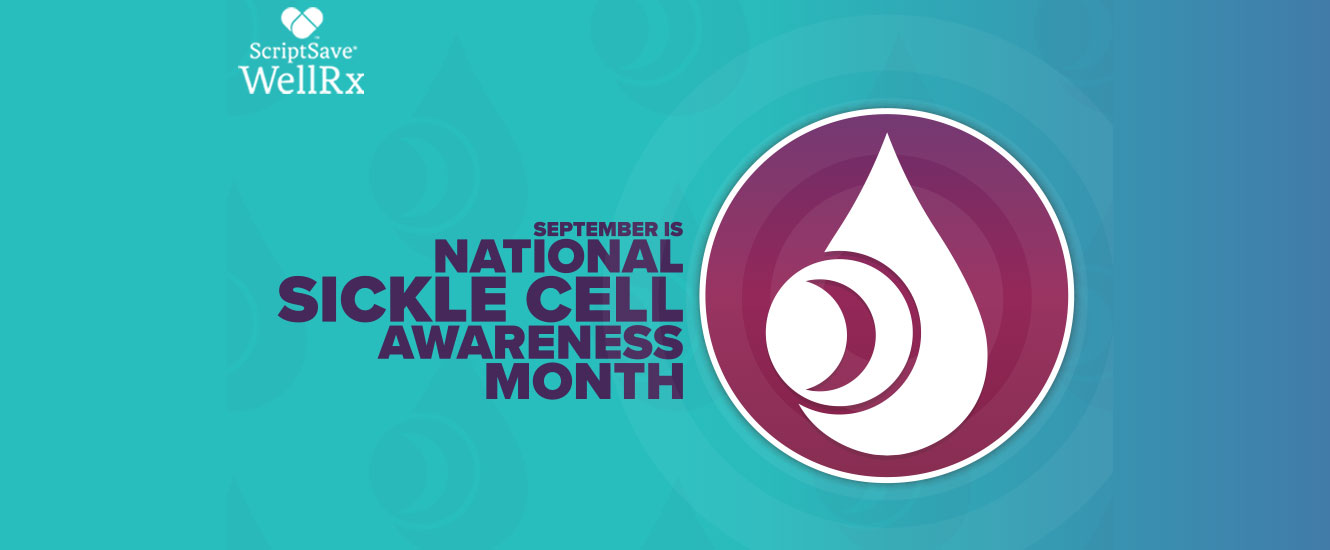September Is National Sickle Cell Awareness Month
September is a National Sickle Cell Awareness Month. Sickle Cell is the United States’ most common inherited blood disease. About 100,000 people suffer from Sickle Cell Disease, and up to three million Americans carry the gene for the disease.
“For almost everyone impacted, coping with inherited red blood cell disorders means putting plans on pause, living with excruciating pain, paying for expensive treatments, and hoping for a day when medications and doctor visits no longer interrupt life,” President Biden said while pledging research support.
Let’s look at Sickle Cell, new treatment options, and ways to find the lowest prescription prices.
What is sickle cell disease?
Sickle Cell Disease (SCD) is an inherited condition that affects the shape of red blood cells that carry oxygen from your lungs to other parts of your body. Rather than disc-shaped cells, the red blood cells become crescent or sickle-shaped in an oxygen-poor environment due to an abnormal protein (Hemoglobin S). The misshaped cells don’t last as long as red blood cells with normal hemoglobin A.
Complications from SCD arise from these red blood cells depriving tissue of oxygen and being sticky and less flexible. Sickle-shaped red blood cells tend to get wedged in the smaller blood vessels.
Who gets sickle cell disease?
About 100,000 Americans have SCD. It disproportionately affects Black people. Ninety percent of those with SCD are of African descent. One in 365 African American babies is born with SCD.
SCD also affects those of South and Central American, Caribbean, Mediterranean, Middle Eastern, and Southeast and South Asian descent. Those of Hispanic descent are the second largest group of Americans to have SCD. One in 16,300 Hispanic American babies is born with the disease.
Sickle cell is inherited
The genetic mutation that causes Hemoglobin S and Sickle Cell is thought to have originally occurred in people who lived where malaria is common, such as in sub-Saharan Africa, India, and Southeast Asia. People whose ancestors came from these parts of the world are disproportionately affected by Sickle Cell.
Carrying one gene for Hemoglobin S provides some protection from developing anemia caused by malaria. Up to three million Americans , or one in 13 African Americans, carry one Sickle Cell gene they’ve inherited from one parent. With one gene, you have Sickle Cell Trait (SCT). SCT is most often asymptomatic.
Sickle Cell Disease, also called Sickle Cell Anemia, occurs if you inherit the gene from both parents. With two Sickle Cell genes, you produce only abnormal Hemoglobin S and are symptomatic. Those with SCD suffer from pain and deteriorating health because of their disease.
Diagnosing sickle cell disease
As of 2006, newborns are screened for Sickle Cell in all 50 states, no matter the baby’s ethnicity. The earlier the treatment for SCD, the better the child will do.
For African American adults who are considering having children but do not know their Sickle Cell status, both parents should have a blood or genetic test for SCT. If both parents carry the gene, their child may receive the Sickle Cell gene from each parent and inherit SCD.
Symptoms of sickle cell disease
Symptoms of SCD result from poor oxygen delivery due to abnormal hemoglobin and blocked blood vessels from the red blood cell’s abnormal shape. Even though babies are born with SCD, they typically don’t have symptoms until about five months of age. In infants and children, symptoms include:
- Fussiness or fatigue from low red blood cells (anemia)
- Yellow skin (jaundice) and whites of the eyes (icterus)
- Swollen, painful hands and feet
- Frequent infections, especially in the lungs (pneumonia), liver (hepatitis), and brain (meningitis)
- An enlarged, painful spleen (splenic sequestration)
Since infections are common in infants and children, contact your healthcare provider or seek medical attention if your child has any fever.
As people with SCD age, they may experience complications from ongoing blood vessel blockage, low blood and oxygen supply to body parts, and the resulting tissue damage. Complications of SCD include:
- Pain crisis or vaso-occlusive episode—the most common SCD complication that’s caused by a blood vessel blockage
- Acute chest syndrome—a life-threatening condition with low oxygen levels from pneumonia or blocked blood vessels in the lungs
- Accumulation of blood in the spleen
- Anemia—due to the short lifespan of sickled red blood cells
- Infections in the lungs, brain, liver
- Joint damage from poor blood supply
- Kidney disease—ranging from bloody urine to kidney failure
- Leg ulcers—from poor blood flow to the legs
- Liver pain and gallstones
- Priapism—a prolonged, painful erection caused by blocked blood vessels
- Stroke—occurs when sickling red blood cells block blood vessels in the brain
- Vision loss—usually due to blocked blood vessels damaging the retina in the back of the eye
Treating sickle cell disease
There are several ways to treat SCD.
Bone Marrow Transplant
Currently, the only cure for SCD is a bone marrow transplant. It is a stem-cell transplant that replaces the red-blood-cell-making cells with normal donor stem cells that produce Hemoglobin A rather than Hemoglobin S.
Donor stem cells come from:
Currently, a bone marrow transplant is limited to children and teens with severe SCD, although adults may receive a bone marrow transplant as part of a clinical trial.
Transplantation requires chemotherapy and/or radiation to kill the existing bone marrow before replacing it with normal marrow stem cells. After transplantation, your child will need to take medications to prevent the rejection of the new marrow cells.
As with any procedure, you and your child’s healthcare provider will need to weigh the risks and benefits of transplantation.
Transfusions
You may receive a blood transfusion if you have anemia, to reduce your chance of stroke, or if you are having surgery. The blood transfusion supplies you with normal hemoglobin A to improve your blood flow and oxygen delivery throughout your body.
Medications
The following medications include Food and Drug Administration-approved disease-modifying medicines and medications to prevent or treat complications of SCD.
Disease-modifying medications:
Voxelotor (Oxbryta): prevents sickling of red blood cells and reduces pain crises. Approved for those with SCD four years old or older.
Crizanlizumab (Adakveo): an intravenous medication that prevents sickle cells from sticking to blood vessel walls. In doing so, Crizanlizumab reduces painful crises and tissue damage from a lack of blood flow.
Hydroxyurea (Droxia, Hydrea): makes red blood cells rounder and less likely to sickle and clog blood vessels. In people with SCD, it:
- Reduces the number of pain crises and decreases ER visits and hospital stays
- Improves anemia and reduces the need for transfusions
- Decreases complications such as acute chest syndrome and organ damage
Penicillin: used twice a day in children from birth to at least five years of age to prevent or minimize the risk of infections. If you’ve had your spleen removed due to SCD, you’ll need penicillin for the rest of your life.
Folic acid (Vitamin B9): helps boost red blood cell production
Pain medications:
- L-Glutamine (Endari): reduces the number of pain crises. Approved for those five years old and older.
- Acetaminophen (Tylenol): for mild to moderate pain
- Ibuprofen (Advil, Motrin): for mild to moderate pain
- Naproxen (Aleve)
- Codeine or stronger opioids: for treatment of moderate to severe pain associated with a pain crisis or vaso-occlusive episode
Saving on prescription and over-the-counter medications
Generic antibiotics and over-the-counter pain medications won’t break the bank. But newer disease-modifying medications come with a hefty price tag. At ScriptSave® WellRx, you can compare prescription prices at pharmacies near you. A quick search revealed a 45% savings on Adakveo and a 77% savings on hydroxyurea less than three miles away.
You can also learn how prescription discount cards work on WellRx, and immediately receive your free Rx savings card or coupons for medications.
For a 30-second overview of WellRx, check out this video.
Living with sickle cell disease
If you have SCD, taking care of yourself is a priority:
- Drink plenty of water.
- Avoid getting overheated.
- Minimize the amount of alcohol you drink.
- Avoid stress if you can.
- Quit smoking and avoid second-hand smoke.
- Getting regular but not overly strenuous exercise.
- Seek medical attention with any signs of infection.
If you’re pregnant, seek prenatal care early in your pregnancy.
Prognosis
Thanks to advances in care, children with SCD have had lower mortality rates after routine vaccinations for pneumonia started in 2000. A child born with SCD now has a 94% chance of surviving to age 18.
Unfortunately, life expectancy for adults hasn’t improved as much. The overall lifespan of a person with SCD is an average of 22 years less than a person without SCD. The most recent findings show the average life expectancy for someone with SCD in the United States is 54 years old.
Living with SCD sadly involves pain, suffering, and morbidity from SCD complications. Seeking better forms of treatment and finding a cure are imperative.
The future of sickle cell disease
In 2018, the Cure Sickle Cell Initiative was formed to support clinical research to find a cure. Researchers are focusing on gene therapy to reduce the pain of crises and cure SCD.
Ways you can help
Learn more about becoming a bone marrow donor.
Allow your obstetrician to collect blood from the umbilical cord and placenta after the cord has been cut. This does not harm your baby in any way and can potentially be a source of stem cells for transplant for SCD, leukemia, lymphoma, or used for disease research. Talk to your obstetrician about cord blood collection if you have questions.
Support an SCD charity of your choice.
Teresa Otto, MD, is a freelance medical writer on a mission to inform readers about the positive impact of good nutrition and a healthy lifestyle. She is a retired anesthesiologist who practiced in Billings, Montana, for most of her career. She graduated from the University of Washington School of Medicine in Seattle and did her anesthesia residency and fellowship at New York University and Columbia-Presbyterian in New York.
Resources:
- https://www.whitehouse.gov/briefing-room/presidential-actions/2022/08/31/a-proclamation-on-national-sickle-cell-awareness-month-2022/
- https://www.cdc.gov/ncbddd/sicklecell/data.html
- https://www.healthychildren.org/English/health-issues/conditions/chronic/Pages/Sickle-Cell-Disease-in-Children.aspx
- https://www.cdc.gov/ncbddd/sicklecell/complications.html
- https://www.uptodate.com/contents/acute-chest-syndrome-acs-in-sickle-cell-disease-adults-and-children#:~:text=INTRODUCTION%20Acute%20chest%20syndrome%20(ACS,regardless%20of%20the%20patient's%20age.
- https://www.medicalnewstoday.com/articles/african-american-anemia#symptoms
- https://www.cdc.gov/ncbddd/sicklecell/documents/factsheet_scicklecell_status.pdf
- https://www.nhlbi.nih.gov/health/blood-bone-marrow-treatments
- https://www.lls.org/sites/default/files/file_assets/cordbloodstemcelltransplantation.pdf
- https://www.ctsearchsupport.org/filtered-search//index?disease=sickle%20cell%20disease&age=&hasTransplant=0&isRelapsed=false&isRefractory=false&isNewlyDiagnosed=false&phase1=true&phase2=true&phase3=true&qol=true&page=1&per_page=8
- https://www.nhlbi.nih.gov/health/sickle-cell-disease/treatment
- https://www.hematology.org/-/media/Hematology/Files/Education/Hydroxyurea-Booklet.pdf
- https://www.aafp.org/pubs/afp/issues/2000/0301/p1363.html
- https://jamanetwork.com/journals/jamanetworkopen/fullarticle/2755485
- https://www.ncbi.nlm.nih.gov/pmc/articles/PMC2867259/#:~:text=Most%20children%20with%20sickle%20cell,the%20leading%20cause%20of%20death.
- https://bloodstemcell.hrsa.gov/donor-information/donate-bone-marrow/joining-registry













 Store & manage your medication list
Store & manage your medication list Medication pricing updates
Medication pricing updates Pill & refill reminders
Pill & refill reminders Medication journal & mood log
Medication journal & mood log